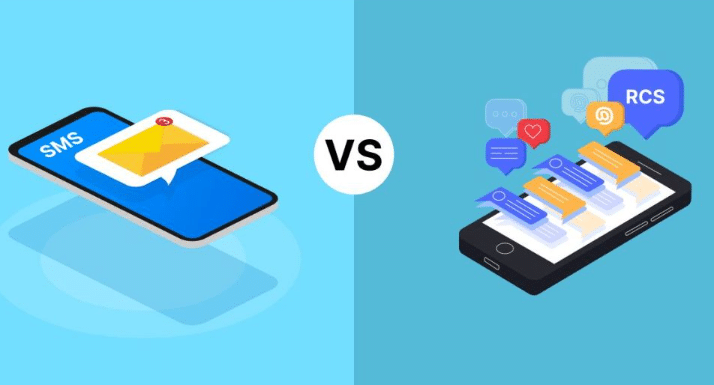Messaging has come a long way since the early days of mobile telephones. What started as a simple message has advanced into an included multi-layered verbal exchange device that enhances multimedia, actual-time updates and user interaction. An example of this boom is the rise of Rich Communication Services (RCS), which promises to surpass the conventional Short Messaging Service (SMS) in phrases of capability and person enjoy This article explores the variations among RCS vs SMS, explore their characteristics, benefits and ability effect on it within the future of telecommunications.
1. Understanding SMS
Overview
Short message carrier (SMS) is the oldest shape of smartphone messaging. Launched in the early Nineteen Nineties, SMS permits subscribers to quickly send textual content messages of up to a hundred and sixty characters. Despite its simplicity, SMS has been a dependable and ubiquitous shape of communication for years.
Key Features
- Character Limit: 160 characters per message.
- Ubiquity: Supported by all mobile phones and networks globally.
- Reliability: Messages are delivered quickly, even on low network signals.
- Security: Operates over secure cellular networks, making interception difficult.
Limitations
- Lack of Multimedia: SMS supports only plain text, with no capability for images, videos, or audio.
- Character Restriction: Limited to 160 characters, leading to fragmented messages if longer texts are sent.
- No Read Receipts: Users cannot see if their message has been read.
- Limited Interaction: No typing indicators or advanced interactive features.
2. Introducing RCS
Overview
Rich Communication Services (RCS) is a communique platform that aims to update SMS with enhanced messaging capabilities just like the ones located in popular immediate messaging programs RCS is IP Multimedia Part of the wider subsystem (IMS) device is backed by the GSM Association (GSMA).
Key Features
- Multimedia Support: Send images, videos, audio, and other rich media.
- Read Receipts: Know when your message has been read by the recipient.
- Typing Indicators: See when the other person is typing a response.
- Group Chat: Create and manage group conversations easily.
- File Sharing: Send and receive documents and files.
- High-Quality Messaging: Supports high-resolution images and longer messages without splitting.
Advantages
- Enhanced User Experience: RCS offers a more engaging and interactive messaging experience.
- Brand Messaging: Businesses can use RCS for richer customer interactions, including sending multimedia content and interactive elements.
- Interoperability: RCS aims to provide a consistent experience across different devices and carriers, unlike proprietary messaging apps.

Limitations
- Carrier and Device Support: RCS is not universally supported; its availability depends on the carrier and the device.
- Data Usage: Unlike SMS, RCS messages are sent over data networks, potentially incurring data charges.
- Security Concerns: RCS lacks end-to-end encryption by default, making it less secure than some messaging apps like WhatsApp or Signal.
3. Comparing RCS vs SMS
Feature Set
- Basic Messaging:
- SMS: Simple text messaging with a 160-character limit.
- RCS: Supports rich media, longer texts, and interactive elements.
- Multimedia:
- SMS: Limited to text only.
- RCS: Supports images, videos, audio, and file sharing.
- Read Receipts and Typing Indicators:
- SMS: Not available.
- RCS: Available, enhancing the user experience.
Compatibility and Availability
- SMS: Universal compatibility across all mobile phones and networks.
- RCS: Dependent on carrier and device support, not yet universally available.
Security
- SMS: Secure over cellular networks but lacks advanced security features.
- RCS: Lacks default end-to-end encryption, raising privacy concerns.
User Interaction
- SMS: Limited to plain text messages, no interactivity.
- RCS: Offers a more interactive experience with multimedia support, read receipts, and typing indicators.
4. The Future of Messaging
Adoption and Growth
RCS is poised to revolutionise cell messaging via handing over a lovely and notably interactive communication experience. However, requirements for logistics and equipment support have slowed adoption. Google and different primary tech players are pushing for more adoption, integrating RCS into their messaging apps and partnering with providers to make certain compatibility.
![A Comparison Between RCS and iMessage [INFOGRAPHIC]](https://www.techloy.com/content/images/2023/12/RCS_Messaging_vs_iMessage_Comparison_Techloy_Graphic.png)
Business Applications
RCS offers vital talents for business conversation. Unlike SMS, RCS lets in groups to have interaction with clients via interactive messaging, promotions and customer support chatbots. This can grow patron satisfaction and pressure engagement, making RCS an attractive alternative for companies looking to leverage cell messaging for advertising and marketing and customer service.
Security Enhancements
One of the maximum critical elements of improving RCS is safety. The lack of default end-to-quit encryption is a major downside. As privateness worries develop, it is going to be vital for RCS to put in force stronger safety features to grow attractiveness and consideration.
Competition from Instant Messaging Apps
RCS faces stiff competition from established instant messaging apps which includes WhatsApp, Facebook Messenger and iMessage, which offers many functions that RCS already ambitions to provide These apps get blessings from stop-to-give up encryption and a huge person base , which provides a project to RCS to benefit a foothold in the marketplace.
Conclusion
The struggle among RCS vs SMS represents the evolution of cell messaging from easy textual content-based communique to a wealthy and interactive experience. While SMS is a reliable and ubiquitous medium, RCS units a precedent for the future of messaging with its superior features and advanced person experience but for more adoption, protection improvements and competitiveness compliance from immediately messaging apps is essential for RCS to reach its complete capability will benefit from the upgrades RCS brings to the desk, making it a possible successor to standard SMS.



